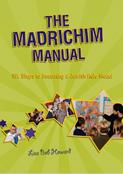- Home
- Play & Learn Home
- Online Enrichment
- Experience Modern Israel
- Israel It's Complicated
- Jewish and Me
- Jewish Holidays Jewish Values
- Jewish Values in Genesis and Jewish Values in Exodus
- Min Ha’aretz
- Our Place in the Universe
- Simply Seder
- The Prophets: Speaking Out for Justice
- Making T'filah Meaningful
- Make, Create, Celebrate
- Yom Haatzmaut Resources
- Hebrew Apps
- About The OLC
- What is the OLC?
- Introduction
- Get Started
- Resources
- OLC Content
- Parent Materials
- See My OLC Classes
- Store
Bringing Camp to School: Are Madrichim the ‘Camp Counselors’ of Your Part-time Program?
Written by Vicki Weber, RJE, 13 of May, 2013
Santa Monica Teacher’s Creative N‘kudot System Encourages Hebrew Practice at Home
Advice from a Jewish Dad: Make Tot Shabbat as Engaging as Secular Toddler Programs
Trained madrichim can help your educational program feel more like camp by offering opportunities for older students to mentor younger students and to step into authentic roles as young Jewish role models.
My synagogue had a ‘Camp Shabbat’ program recently. An alternative to the regular Friday night services, it featured a family dinner of traditional camp cookery (yes, even s’mores) followed by a kabbalat Shabbat service around a (fake) campfire. It was a little kooky, but fun, energetic, and participatory. I had a terrific time. Is this a model for ongoing Friday night services? Probably not. (A battery-powered camp fire has its limits, after all.) It was a fun, onetime program.
Summer camp seems to be a model to emulate these days, especially in our educational settings. We all want to capture the magic of camp and use it to increase the enjoyment and engagement our students have in the programs at our home institutions. At the same time, many part time programs are asking how they can keep students meaningfully engaged beyond the b’nai mitzvah years and on into high school.
But what aspects of the camp experience can we legitimately recreate within the context of the religious school?
Jewish Camp Consultant Michelle Shapiro Abraham, writing recently in the JTS Davidson School Reframe blog, discussed her work to tease out what makes camp special. “What creates ‘summers that last a lifetime’ isn’t just the setting or program model,” she writes. “Summers that last a lifetime are intentionally crafted below the surface, cultivating magic, interaction by interaction.”
The ‘magic’ she writes, isn’t in the lakes, but in the relationships and the community built person to person. She urges schools to move beyond ‘surface strategies’ of one-shot programs to ‘intentionally crafted embedded strategies’ that focus on teaching staff how to create meaningful relationships.
A robust madrichim program could be just the answer.
It was a great answer for Rabbi Sarah Graff, of Congregation Kol Emeth in Palo Alto, CA. Rabbi Graff, also writing on the Reframe blog, described her own process. “We asked ourselves what wisdom we could bring from the successes of Jewish summer camps? My conclusion was a serious teen Madrichim program.”
Rabbi Graff advertised her program among the teens in her congregation as a prestigious leadership development and community service opportunity. The madrichim would teach tefilah for an hour on Shabbat morning to 3rd and 4th graders, spending part of the time working 1-on-1 with them on Hebrew reading and prayer skills, and the rest of the time leading camp-style tefilah activities and games. These activities would be planned by the madrichim themselves on Tuesday nights, under Rabbi Graff’s guidance and supervision.
Rabbi Graff also had her madrichim staff play an important role in their 3rd-7th grade Jr. Congregation service – "sitting among the kids, participating actively, sometimes doing skits or leading discussion, and partnering with a staff person in bringing new energy and dynamic leadership to the service.”
“I invested several hours each week in leading the weekly Madrichim training sessions, emailing back and forth with the madrichim who were writing the lesson plan for that week, and providing some supervision of the actual class they were teaching. I felt it was a worthwhile use of my time though, as I watched these 14-16-year-olds become owners of their Judaism. Two years before, many of them had been sitting in Jr. Congregation complaining they were bored. Now they were having heated discussions about the meaning of prayers and how they could bring them to life for ‘their kids’” writes Rabbi Graff.
Michelle Abraham asks, “What unique assets do schools and congregations have and how can we leverage these assets to impact Jewish identity building?”
Perhaps we need look no further than our own teens.
You can read the full articles by Michelle Shapiro Abraham and Rabbi Sarah Graff on the Reframe blog, created by the William Davidson Graduate School of Jewish Education at the Jewish Theological Seminary.
Do you have a Madrichim program for your school?
The Madrichim Manual can help you establish a training program in a series of workshop settings that prepare students eighth grade and up for mentoring and leadership responsibilities.


